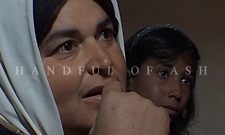Female Genital Mutilation a Growing Problem in Iran
The hideous practice of female genital mutilation (FGM) is neither an exclusively Muslim nor a principally Middle Eastern phenomenon. It exists among non-Muslims through wide areas of Africa.
But in Iraq and Iran, FGM is mainly associated with Kurds. The Kurdish Regional Government (KRG) in Iraq, which is fighting against the terrorists of the so-called “Islamic State,” has pursued a substantive effort to eradicate FGM. As reported here, the KRG parliament introduced legislation prohibiting FGM in 2007. The law was passed in 2011 and forbade, additionally, child marriage, so-called “honor murders,” and other abuses suffered typically by women. In 2010, the KRG health ministry produced a plan to eliminate FGM and called on Islamic clergy to condemn the custom.
Last year, Thomas von der Osten-Sacken, director in Iraq of a German-based charity, WADI—the Association for Crisis Assistance and Development Cooperation—said in an interview that FGM in Iraqi Kurdistan had declined dramatically, and that measurable success in stopping FGM there could be credited to the political change that began in 1991. “Saddam Hussein lost power here back in 1991. There is a relative degree of freedom,” von der Osten-Sacken said. That freedom—and other achievements by the Iraqi Kurds—were made possible, as should be recognized, by the decision of President George H.W. Bush to impose a “no-fly zone” over Iraqi Kurdistan.
By contrast, “the existence of FGM in Iran is a well-kept secret,” according to the organization Stop FGM Middle East. On November 25, 2014, Radio Farda, the U.S.-backed Farsi-language broadcast directed to Iran, aired a 30-minute documentary on FGM under the rule of the Islamic Republic. Translated by Stop FGM Middle East, the transcript revealed yet another cruel feature of Iranian life, reinforced by the hypocrisy of the ruling clerics.
Radio Farda noted that in 2014 Iran was added, for the first time, to the global list of countries in which FGM is present. The media agency interviewed Iranian researcher Rayeyeh Mozafarian, of the University of Shiraz, who accumulated interviews on FGM between 2007 and 2009. She stated, “FGM is carried out in private houses by midwives and not by surgeons in hospitals.” FGM goes unmentioned in Iranian law, which does criminalize mutilation of the body. But Mozafarian determined, “Despite the practice being liable to prosecution, practically nobody is charged. . . . No victim files charges against her own parents.”
Mozafarian specified that FGM in Iran is concentrated in the northwestern provinces of Iranian Azerbaijan, Iranian Kurdistan, Kermanshah, and Ilam, and the Persian Gulf province of Hormozgan. She denied that FGM is a cultural problem and identified it with Islam, since, she argued, “People say that women who do not let themselves be cut are not Muslims.” But Mozafarian stipulated, “there are differences in opinion in Islam” about FGM. Women’s rights activist and lawyer Bayan Azizi, in speaking to Radio Farda, referred to these as border regions along a female-cutting “line.”
Some Iranian clerics support FGM, but exiled Iranian cleric Hassan Yousefi Eshkevari, who opposes the theocratic state and lives in Germany, disagreed with them. He informed Radio Farda, “female circumcision is not mentioned . . . in the Koran or in the Sunna or Hadiths [traditions derived from accounts of Muhammad’s oral teachings]. . . . For the past 1,400 years there was no reflection of this topic in books by Islamic scholars or clerics. It is certain that there is nothing in the Koran.”
He added, “Islam does not have an ascetic view of sexuality. . . . But unfortunately, there are such views in our religious culture. Therefore, control of the female body is important and sex and the sexual drive are seen as bad.” That is a motivation for infliction of FGM on young girls—to diminish their interest in sex, even after marriage.
As described in the Radio Farda documentary, the impact of FGM on women and their marriages is often devastating. A woman identified only as Roja said, “In my opinion the biggest problem in Iran is sexuality. Many marriages break up because of it, because they don’t speak openly about it. Because the partners often have sexual problems.”
Parvin Zabihi, a prominent Iranian Kurdish advocate for women’s rights, told Radio Farda, “the men want it. We must talk first about acceptance in society. Society believes that circumcised girls are more innocent and such girls get more proposals of marriage and are more favored. This means that it is actually something the men want.”
Responding to an interviewer’s query as to whether the ameliorative rhetoric of president Hassan Rouhani will bring FGM to an end in Iran, Rayeyeh Mozafarian pointed out that legal measures against FGM in Iran are “often talked about, but not implemented.” As in other contexts, the Iranian clergy are inclined to avoid, rather than confront, the shameful problems under their dominion. For his part, supreme leader Ali Khamenei, according to Radio Farda, appears never to have an expressed an opinion on FGM.
Official brutality and indifference continue to define the lives of ordinary Iranians. Meaningless promises are made to Iranians and to the world by the clerical dictatorship. Even fighting the so-called Islamic State, Iraqi Kurds have advantages denied their relatives east of the border.






 Clinton: 'Cultural Tradition' is No Excuse for Female Genital Mutilation
Clinton: 'Cultural Tradition' is No Excuse for Female Genital Mutilation


